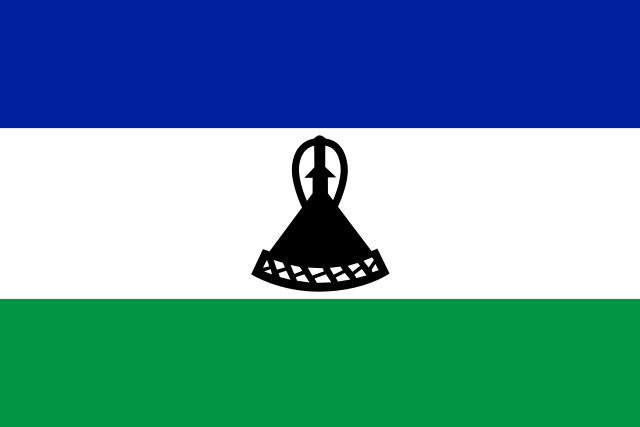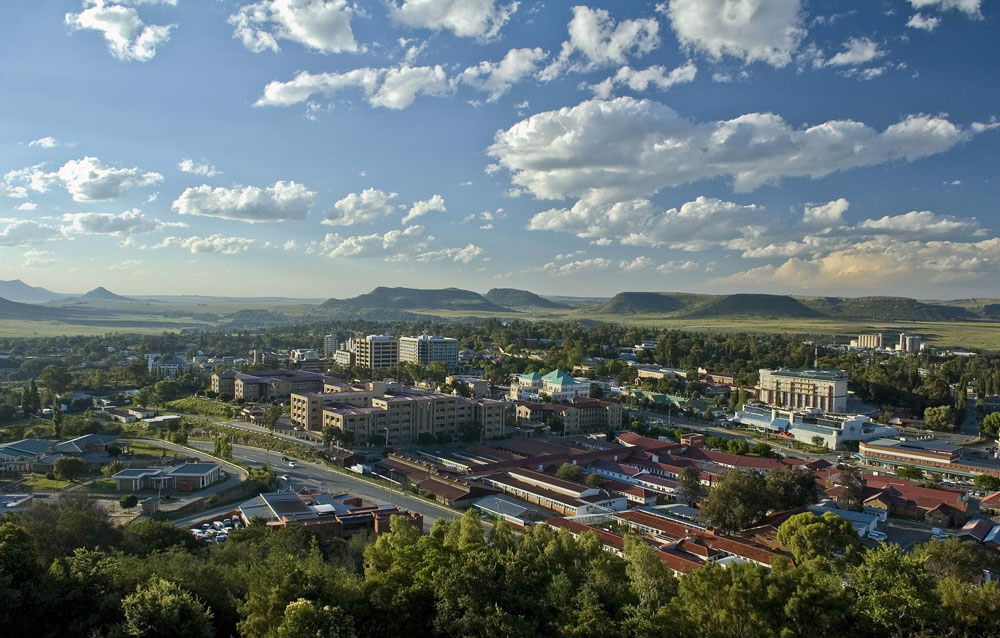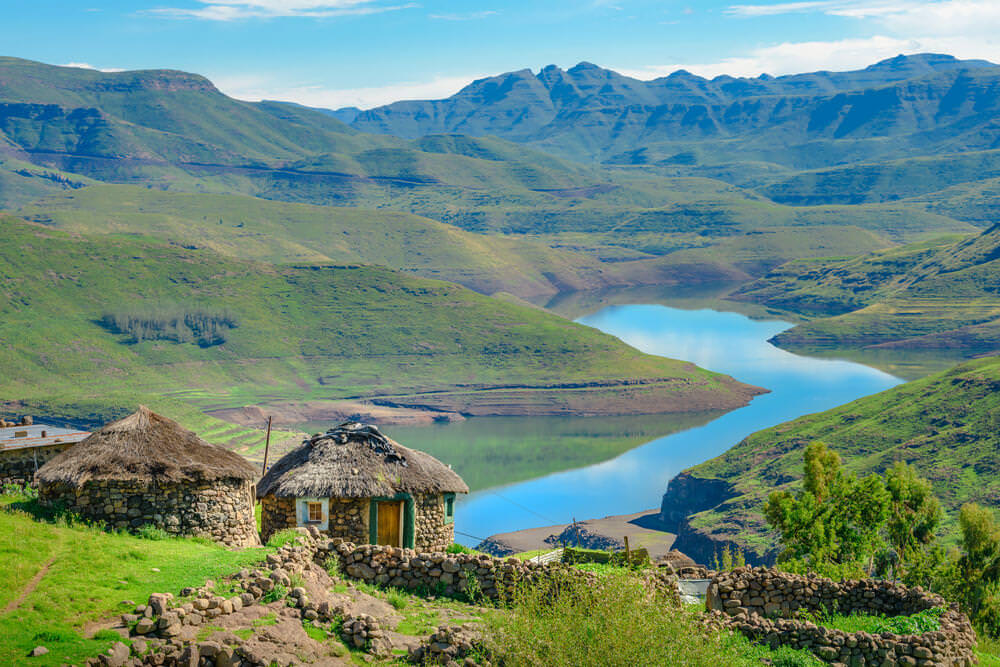Lesotho

Capital city: Maseru
Population: 2,159,079 (2021)
Land area: 30,355 km²
Official languages: Sesotho, English
Legal system: Customary and general laws
Time zone: GMT+2
Currency: Lesotho loti
GDP: 2.30 USD Billion (2021 est.)
Main industries: Food, beverages, textiles and apparel, handicrafts, construction, tourism, mining
Principal exports: Garments, diamonds, water, electricity, wool and mohair
Lesotho (formerly Basutoland) is a monarchy whose borders are entirely landlocked by South Africa. The country is a mountainous region of Southern Africa: The Maloti and Drakensberg Mountain ranges can be found in Lesotho. In addition to this stunning landscape, Lesotho benefits from a considerable water supply, which it uses to generate hydroelectric power and for the large-scale water-transfer plan with South Africa, namely the Lesotho Highlands Water Project.

Demographic
Lesotho’s population last recorded in 2021 was pegged at 2,281,454. The Sotho form the majority of the nation’s population, with a smaller number of Zulu inhabitants. There can be found many religions in Lesotho, ranging from Roman Catholicism and other forms of Christianity to Zionist and independent churches. Most Lesotho’s citizens populate the lowlands, along the Caledon River, where the population density can be considered high for an African nation. Although around 75% of the population lives rurally in familial clan villages, migration to the capital city of Maseru has been noted for over 50 years. Lesotho’s population can be considered young, with a strong majority of its people ageing under 30 years of age.
Lesotho is home to several languages, including Phuthi, Sesotho, Xhosa, Zulu and English. The national and official languages of Lesotho are English and Sesotho. English is generally used in government offices and business context. On the other hand, Sesotho (known as Sotho), is commonly referred to as a Bantu language. It is the language of instruction for primary education.
History
Archaeological records dating back to the New Stone Age, also known as the Neolithic Period, showcase evidence of Khoisan speaking hunter-gatherer settlement activity on the territory of present-day Lesotho. 16th century onwards, refugees from the Bantu tribal wars traversed the grasslands of Southern Africa and eventually settled in the valley and meadows surrounding the Caledon River and the present-day South Africa-Lesotho border.
The history of present-day Lesotho can be traced back to the 19th century when the region was inhabited by various ethnic groups, including the San, Khoikhoi, and Bantu peoples. During the early 1800s, the region was dominated by the Sotho people, who were united under the leadership of King Moshoeshoe I of the Moketeli lineage of the Bakwena tribe. King Moshoeshoe I was a skilled diplomat and military strategist, who successfully defended his people against various attacks from rival ethnic groups and European colonizers. In the turbulent period of the 1820s which was known as the “Difqane”, various clans and groups of people migrated into the area that would become Lesotho, seeking protection from the Zulu kingdom, which was expanding its territory in present-day South Africa. Moshoeshoe I united these groups under his leadership and formed a powerful kingdom, known as Basotho, which was able to resist attacks from the Zulus, as well as from the British, who were expanding their colonial control in southern Africa. As the Basotho came under increasingly deadly attacks from the Boers of the Orange Free State, Moshoeshoe negotiated for British protection during the beginning of the conflicts brought about by the Boers in 1834 and again in the 1860s as the 30 years and counting-long warfare had stripped the Basotho of most of their territory in the western region of the Caledon River.
The kingdom was annexed by the British in 1868 under the leadership of Sir Philip Wodehouse, who was then the governor and high commissioner of the Cape Colony. The kingdom, known then as Basutoland, remained largely independent but was under British influence and protection. The British administration introduced Western-style institutions and systems, including a court system, railway lines, telegraph technology and a police force, but left the traditional system of governance largely intact. Upon the dealth of Moshoeshoe I in 1870, the colony was annexed to the Cape Colony. This decision was made without the consent of the Basotho which led to political instability and skirmishes with the Cape Colony administration due to their efforts to take away the former’s military and self-defense abilities under the stipulations of the Cape Peace Preservation Act of 1878; this attempt was largely unsuccessful due to the successful pushback by the Basotho however it ultimately led to the Gun War 1880-1881. Consequently, Basutoland was handed back to the British in 1884 and was one of the three British High Commission Territories in the Southern African region, alongside Swaziland and Bechuanaland, present-day Botswana.
The discovery of abundant mineral reserve in the late 19th century due to which Basutoland was incorporated in to the Union of South Africa as a means to legislate policies that allow landowners and miners to source cheap labour to build numerous mining centres. The Sotho farmers capitalised on this movement by producing surplus grain to be sold to the newly created South African markets and travelled to the region in search of cash and firearms in exchange for labour. These workers became critical for the South African mining industry but at the expense of the population of Basutoland and its economic and social services development. While Basutoland maintained considerable self-administrative powers in the hands of the local paramount chiefs that followed Moshoeshoe I, the chieftains could do little to prevent further degradation of the territory’s economic and social systems and with the onset of the Great Depression coinciding with a massive drought in the 2930s and 1930s, the population growth rate of the land was greatly staggered for a considerable amount of time.
Feelings of resentment grow to become opposition to the British colonial administration although attempts by anti-British organisations and movements did not gain much ground and in the early 1930s, the colonial administration made attempts to decrease the influence of the local chiefs but such efforts came to an abrupt halt with the start of the Second World War during which the British recruited over 20,000 Sotho to be deployed in Europe, the Middle East and North Africa. Due to this, reforms were temporarily suspended and during this time three main political parties came to the fore which were the Basutoland Congress Party (BCP) set up in 1952 under the leadership of Ntsu Mokhele, the Basutoland National Party (BNP) set up in 1958 by Chief Leabua Jonathan, and the Marema-Tlou Freedom Party set up in 1963 primarily for the protection of the powers of the principal chiefs.
By 1955, the Basutoland Council was given the right to govern internal affairs and a decade later the region was made a self-governing territory with general elections held in the same year for a new legislative assembly. The BNP won the elections with a large margin and by October 4 1966, were successful in their push for complete self-governance; the nation gained independence on that day and was renamed to the Kingdom of Lesotho with the paramount chief Moshoeshoe II instated as the king and Chief Jonathan of the BNP as prime minister.
Key dates
1820s Basutoland founded after several ethnic groups unite under Moshoeshoe I seeking protection from the Zulus
1834 Three decades long conflict between Batsuoland and the Boers of the Orange Free State
1860s After negotiations between the British and Moshoeshoe I, Batsuoland is put under British protection
1871 Batsuoland is annexed to the Cape Colony without consultation
1884 Batsuoland officially becomes a British colony with Paramount chiefs retaining traditional autonomy
1966 Independence as Kingdom of Lesotho with Moshoeshoe II as king; Chief Leabua Jonathan (Basotho National Party) becomes Prime Minister
1970 Opposition Basutoland Congress Party leads in polls, but Chief Jonathan suspends constitution, sends king into temporary exile.
1986 South Africa blocks borders, demanding expulsion of anti-apartheid activists. Major-General Justin Lekhanya replaces Chief Jonathan in coup
1990 King Moshoeshoe II goes into exile. His son is sworn in as Letsie III.
1995-1996 Moshoeshoe II reclaims his throne but dies in a car crash making Letsie III king once more.
1998 Lesotho Congress of Democrats (LCD) wins general elections, Pakalitha Mosisili becomes prime minister. South African Development Community (SADC) sends troops to help restore order.
2002 Prime Minister Mosisili wins second five-year term.
2017 Thomas Thabane returns to power after winning elections in June.

Legal System and Government
Lesotho is a constitutional monarchy in which the king serves as the head of state. The prime minister serves as the head of government and the armed forces. The bicameral parliament consists of an elected National Assembly and an appointed Senate. The 120 members of the National Assembly are elected to five-year terms. The Senate consists of 22 traditional chiefs and 11 members selected by the king. The king does not have any executive authority and is considered as a national symbol; executive power rests with the cabinet, which is led by the prime minister.
Lesotho’s legal system is based on Roman-Dutch, English, and customary law. Magistrates’ courts have jurisdiction in their districts and parties may appeal from subordinate courts to the Court of Appeal and the High Court. The High Court has jurisdiction to hear the most serious civil and criminal cases and appeals from the lower courts. Appeals from the High Court come before the Court of Appeal.
Economy
Lesotho is a lower-middle-income country with an economy majorly export-driven and based primarily on subsistence farming, livestock farming, construction and small-scale industries including textiles, footwear and food processing.
Post-independence, the agriculture sector was the dominant pillar of the economy with a contribution of over 50% of GDP up until 1976; however, due to natural climate factors like droughts, poor resource management and lack of technological advancements, the sector has been declining in contribution, making up only 5% of GDP contribution in 2021. Challenges notwithstanding, the sector still employs 57% of the labour force as majority of the population relies on subsistence farming for local consumption and livelihood. The major crops include corn, beans, wheat, peas and sorghum but due to the challenges the country is a net-importing country of food commodities.
Since the 1980s, the Lesotho government has made significant progress in developing the manufacturing and mining industries. The industry sector of Lesotho contributes 34.2% of GDP and employs 13-15% of the labour force; manufacturing comprises 15% of the 34.2% GDP contribution. The dominant industries in Lesotho are mining and textile and apparel. Lesotho is well-known for its diamond production with the Letseng Diamond Mine being the world’s highest diamond mine at a height of 3.1 km above ground. A valuable source unique to Lesotho is water. The nation has earned over US$746 million from selling metrics of clean water to its neighbour South Africa; but due to the spare availability of the liquid to local communities it is often referred to as “white gold”.
The services sector of Lesotho is the largest in terms of GDP contribution, comprising 49.2% of GDP and the sector employs 42% of the labour force. Travel and tourism is a big contributor to this percentage owing about 16% on its own, and other services include construction, retails, hospitality, financial services and logistics.
South Africa and Lesotho share a customs union, communications systems, and an industrial railway route. Such a partnership is favourable for South Africa, who benefits from the Lesotho Highlands Water Project in return for economic aid to Lesotho. Lesotho imports a large majority of its food, as droughts have caused crop yields to diminish. Lesotho’s primary exports include clothing and furniture and are largely imported by South Africa and the United States.
Trade
Lesotho’s GDP in 2021 was estimated to be US$2.49 billion. In 2021, Lesotho’s top exports included natural and cultured pearls, precious/semi-precious stones and precious metals (34.8%), knitted/crocheted articles of apparel and clothing accessories (26.7%), knitted/crocheted articles of apparel and clothing accessories not knitted/crocheted (16.6%) and wool, fine or coarse animal hair, horsehair yarns and woven fabric (6.3%). These exports were predominantly destined for South Africa (33.0%), Belgium (33.0%) and the US (30.0%). In terms of imports, for the year 2021, Lesotho largely imported mineral fuels, oils and products of their distillation (15.4%), electrical machinery, appliances and equipment (5.9%), knitted/crocheted fabrics (5.7%) and vehicles rolling stock (other than railway/tramway) and parts thereof (4.5%). These commodities were predominantly imported from Commonwealth neighbour South Africa (71.1%) with notable imports also from China (8.1%) and Italy (3.8%).
Lesotho has the freedom to set the exchange rate of its own currency through its membership of the Common Monetary Area; however, the country elected to fix the loti to the South African rand. Lesotho is also a member of the Southern African Customs Union, from which it receives compensation payments from South Africa and applies its common external tariff, which ranges from 0 to 30%.
Investment Opportunities
Lesotho offers a stable social and political environment with a dynamic and investor friendly business environment. The nation has a skilled labour force that is proficient in English and has experience in various sectors. The government has also established vocational training centres to train workers in specialized skills.
Although hydroelectricity generation projects already exist in Lesotho, financial investment could help the country to capitalise on its natural resources and extend production of green energy throughout the country and South Africa. Similar projects could be established to capture fresh mountain water to be exported.
According to research, Lesotho hosts uranium deposits that have lay untouched by commercial entities. Investors interested in nuclear power may be encouraged to exploit these reserves by establishing extraction projects, as this would bring employment into the north-western region and contribute to Lesotho’s economy. Manufacturing has been a growing sector in Lesotho for the last two decades. Small industrial projects and enterprises have produced candles, furniture and ceramics. However, due to the diamonds mined in Lesotho, the manufacturing industry could be expanded if foreign investment were to bolster diamond cutting and polishing services.
Lesotho offers various investment incentives to foreign investors to attract and promote foreign direct investment (FDI) in the country. In terms of tax incentives, Lesotho offers tax incentives to foreign investors in various sectors, including manufacturing, tourism, and agriculture. Foreign investors can enjoy a corporate tax rate of 10% for the first 10 years of operation, followed by a 25% rate for the next 10 years. There is also no Value Added Tax (VAT) on exports, and no customs duty on raw materials and machinery imported for manufacturing purposes. The African nation offers investment protection to foreign investors through the Bilateral Investment Treaties (BITs) it has signed with various countries. The BITs protect investors against expropriation, nationalization, and discriminatory practices.
The Lesotho One Stop Business Facilitation Center (OSBFC) acts as a single point of contact for foreign investors. The OSBFC provides information on investment opportunities, licensing procedures, and other business-related matters. Furthermore, Lesotho has established Special Economic Zones (SEZs) to promote foreign investment in the country. The SEZs offer various incentives, including tax holidays, duty exemptions, and streamlined licensing procedures.
Sources
https://data.worldbank.org/indicator/SP.POP.TOTL?locations=LS
https://thecommonwealth.org/our-member-countries/lesotho
https://www.bbc.com/news/world-africa-13729501
https://www.doingbusiness.org/en/data/exploreeconomies/lesotho
https://www.britannica.com/place/Lesotho/Manufacturing
https://www.privacyshield.gov/article?id=Lesotho-import-tariffs
https://www.bbc.com/news/world-africa-13729501
https://www.gov.ls/about-lesotho/
https://www.commonwealthgovernance.org/countries/africa/lesotho/judicial-system/
https://oec.world/en/profile/country/lso
https://www.ifad.org/en/web/operations/w/country/lesotho
https://data.worldbank.org/indicator/NV.SRV.TOTL.ZS?locations=LS
https://data.worldbank.org/indicator/SL.SRV.EMPL.ZS?locations=LS
https://www.worldatlas.com/articles/what-are-the-biggest-industries-in-lesotho.html
https://www.lndc.org.ls/content/how-structure-economy-lesotho
https://allafrica.com/stories/202104120182.html
https://www.state.gov/reports/2021-investment-climate-statements/lesotho/
https://www.doingbusiness.org/content/dam/doingBusiness/country/l/lesotho/LSO.pdf
http://www.lndc.org.ls/lipetc/
https://www.trade.gov/knowledge-product/lesotho-investment-opportunities-manufacturing